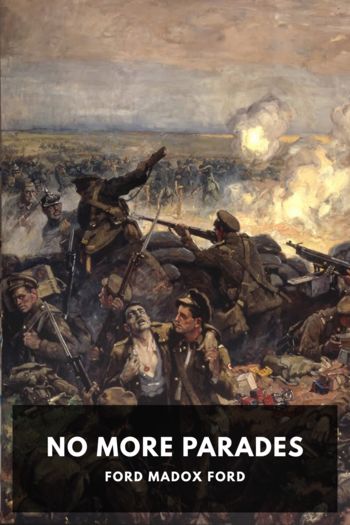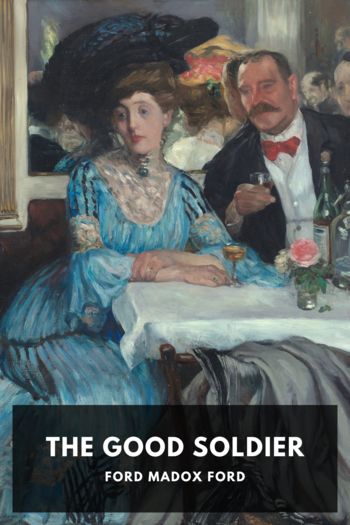Some Do Not … by Ford Madox Ford (story read aloud txt) 📕

- Author: Ford Madox Ford
Book online «Some Do Not … by Ford Madox Ford (story read aloud txt) 📕». Author Ford Madox Ford
Sylvia said quickly:
“Don’t try!” In a slower tone she added: “I don’t in the least want to know. …”
“Well, she was an Egeria!” Tietjens said. “An inspiration to the distinguished. Mrs. Macmaster is all that. The geniuses swarm round her, and with the really select ones she corresponds. She writes superior letters, about the Higher Morality usually; very delicate in feeling. Scotch naturally. When they go abroad she sends them snatches of London literary happenings; well done, mind you! And then, every now and then, she slips in something she wants Macmaster to have. But with great delicacy. … Say it’s this C.B … she transfuses into the minds of Genius One, Two and Three the idea of a C.B. for Macmaster. … Genius No. One lunches with the Deputy Sub-Patronage Secretary, who looks after literary honours and lunches with geniuses to get the gossip. …”
Sylvia asked:
“Why did you lend Macmaster all that money?”
“Mind you,” Tietjens continued his own speech, “it’s perfectly proper. That’s the way patronage is distributed in this country; it’s the way it should be. The only clean way. Mrs. Duchemin backs Macmaster because he’s a first-class fellow for his job. And she is an influence over the geniuses because she’s a first-class person for hers. … She represents the higher, nicer morality for really nice Scots. Before long she will be getting tickets stopped from being sent to people for the Academy soireés. She already does it for the Royal Bounty dinners. A little later, when Macmaster is knighted for bashing the French in the eye, she’ll have a tiny share in auguster assemblies. … Those people have to ask somebody for advice. Well, one day you’ll want to present some débutante. And you won’t get a ticket. …”
“Then I’m glad,” Sylvia exclaimed, “that I wrote to Brownie’s uncle about the woman. I was a little sorry this morning because, from what Glorvina told me, you’re in such a devil of a hole. …”
“Who’s Brownie’s uncle?” Tietjens asked. “Lord … Lord … The banker! I know Brownie’s in his uncle’s bank.”
“Port Scatho!” Sylvia said. “I wish you wouldn’t act forgetting people’s names. You overdo it.”
Tietjens’ face went a shade whiter. …
“Port Scatho,” he said, “is the chairman of the Inn Billeting Committees, of course. And you wrote to him? …”
“I’m sorry,” Sylvia said. “I mean I’m sorry I said that about your forgetting. … I wrote to him and said that as a resident of the Inn I objected to your mistress—he knows the relationship, of course!—creeping in every Friday under a heavy veil and creeping out every Saturday at four in the morning.”
“Lord Port Scatho knows about my relationship,” Tietjens began.
“He saw her in your arms in the train,” Sylvia said. “It upset Brownie so much he offered to shut down your overdraft and return any cheques you had out marked R.D.”
“To please you?” Tietjens asked. “Do bankers do that sort of thing? It’s a new light on British society. …”
“I suppose bankers try to please their women friends, like other men,” Sylvia said. “I told him very emphatically it wouldn’t please me … But …” She hesitated: “I wouldn’t give him a chance to get back on you. I don’t want to interfere in your affairs. But Brownie doesn’t like you. …”
“He wants you to divorce me and marry him?” Tietjens asked.
“How did you know?” Sylvia asked indifferently. “I let him give me lunch now and then because it’s convenient to have him manage my affairs, you being away. … But of course he hates you for being in the army. All the men who aren’t hate all the men who are. And, of course, when there’s a woman between them the men who aren’t do all they can to do the others in. When they’re bankers they have a pretty good pull. …”
“I suppose they have,” Tietjens said, vaguely; “of course they would have. …”
Sylvia abandoned the blind-cord on which she had been dragging with one hand. In order that light might fall on her face and give more impressiveness to her words, for, in a minute or two, when she felt brave enough, she meant really to let him have her bad news!—she drifted to the fireplace. He followed her round, turning on his chair to give her his face.
She said:
“Look here, it’s all the fault of this beastly war, isn’t it? Can you deny it? … I mean that decent, gentlemanly fellows like Brownie have turned into beastly squits!”
“I suppose it is,” Tietjens said dully. “Yes, certainly it is. You’re quite right. It’s the incidental degeneration of the heroic impulse: if the heroic impulse has too even a strain put on it the incidental degeneration gets the upper hand. That accounts for the Brownies … all the Brownies … turning squits. …”
“Then why do you go on with it?” Sylvia said. “God knows I could wangle you out if you’d back me in the least little way.”
Tietjens said:
“Thanks! I prefer to remain in it. … How else am I to get a living? …”
“You know then,” Sylvia exclaimed almost shrilly. “You know that they won’t have you back in the office if they can find a way of getting you out. …”
“Oh, they’ll find that!” Tietjens said. … He continued his other speech: “When we go to war with France,” he said dully. … And Sylvia knew he was only now formulating his settled opinion so as not to have his active brain to give to the discussion. He must be thinking hard of the Wannop girl! With her littleness: her tweed-skirtishness. … A provincial miniature of herself, Sylvia Tietjens. … If she, then, had been miniature, provincial. … But Tietjens’ words cut her as if she had been lashed with a dog-whip. “We shall behave more creditably,” he had said, “because there will be less heroic impulse about it. We shall … half of us … be ashamed of ourselves. So there will be much less incidental degeneration.”
Sylvia, who by that was listening to him, abandoned the consideration of Miss Wannop and the pretence that obsessed her of Tietjens saying four words, against a background of books at Macmaster’s party. She exclaimed:
“Good God! What are





Comments (0)